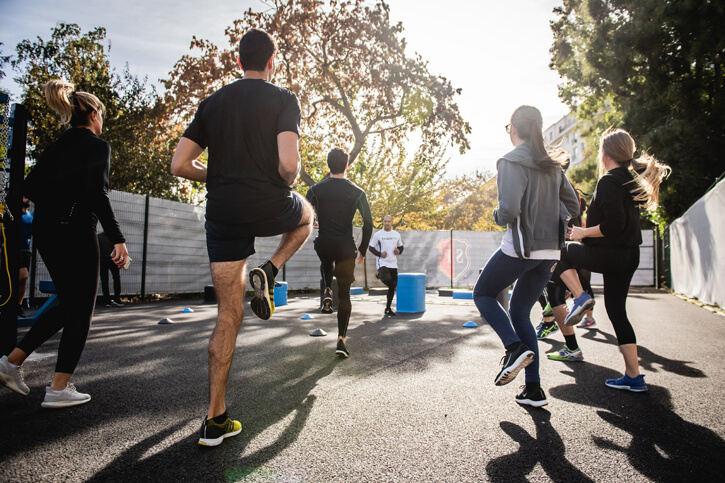There is no shortage of advertisements on the Internet promoting supplements that are purported to improve memory. It’s now a $3 billion market. All too often, the claims made for these supplements are unsubstantiated, and the maker of at least one product has been accused by the Federal Trade Commission (FTC) of false and deceptive advertising.[i]
Upon the release of an AARP Brain Health and Supplements Survey, Senior Vice President for Policy, Sarah Lenz Lock, summed up the organization’s position saying, “Supplements for brain health appear to be a huge waste of money for the 25 percent of adults over 50 who take them.”[ii]
Not to worry. There is something you can do to address age-related decline in memory and brain function, and it’s substantiated by rigorous scientific research. It doesn’t come in a bottle and it will cost you little to nothing. It’s called exercise and there is no product on the market that can begin to match the benefits it affords the brain. And what if you’ve never been a fan of exercise? Chances are the research findings will put some lift in your step.
Recently, a team of Canadian researchers reported that aerobic exercise – the type that elevates heart rate for a sustained period of time – may be the most powerful strategy we have to not only improve memory and brain function but substantially reduce the risk of dementia.[iii]
While it’s been apparent for decades that those who exercise regularly tend to perform better cognitively across their lifespan, the Canadian researchers found that exercise – even late in life – can help those who have not previously made exercise a priority reclaim lost cognitive health.
For the study, the Canadian team enrolled 206 participants aged 50 to 83 who were generally healthy. Yet all were living minimally active lives getting no more than two hours of physical activity per week. The subjects were first given a battery of tests to determine their cognitive health including measuring processing speed, executive function, verbal memory, figurative memory, fluency, and attention. Subjects were also given an MRI scan that enabled researchers to measure blood flow to the subjects’ brains.
The subjects were then asked to perform moderate intensity exercise 4 days per week, 3 sessions of which were supervised by researchers at the University of Calgary. The duration of exercise was initially 20 minutes but progressed to 40 minutes, and each session was followed by a 5-minute cool down (stretching) period.
After 6 months participants were tested again for cognitive performance and for blood flow to the brain. Not only was memory improved, executive function (allows us to plan, focus attention, and execute goals) improved 5.7 percent, verbal fluency (the ease with which one can produce words) improved 2.4 percent, and peak blood flow to the brain improved 2.8 percent. When the amount of blood reaching the brain increases, so does the amount of oxygen that is critical to brain cell function and survival.
What’s worth emphasizing is these improvements were seen across the entire group of participants – even in those in their 80s.
In a similar study of adults aged 20 to 67 that also ran for 6 months, Columbia University researchers found aerobic exercise performed four times weekly at moderate intensity resulted in remarkable improvements in cognitive function.[iv]
Participants were divided into two groups: the control group who performed a simple stretching program and those who performed exercise. The exercisers could choose any form of aerobic exercise they wished as long as they maintained their prescribed heart rate. All the participants were given a battery of cognitive exams before they embarked upon their training programs. Six months later they were tested once again. The 40-year-old exercisers performed in their second round of tests with the mental acuity of people ten years younger. The 60-year-olds performed similar to people 20 years younger. No cognitive improvements were seen in the group that did stretching only.
Aerobic exercise improves brain health in a number of ways beyond improving blood flow to the brain. It helps reduce the risk of 7 factors that are independently associated with cognitive decline and greater risk of dementia. This includes high blood pressure, high cholesterol, inflammation, elevated cortisol levels, insulin resistance, anxiety, and depression. Moreover, exercise literally improves the structure and function of the brain by promoting the formation of new neurons and synapses. There is no supplement or prescription drug that can offer these outcomes.
Now here’s the catch: According National Center for Health Statistics, just 24.2 percent of adults 18 and older get the minimum recommended amount of daily exercise. Although 150 minutes of moderate intensity aerobic exercise may sound like a lot, it breaks down to just 30 minutes 5 days per week.
If you are new to exercise, a simple, safe, and effective way to ease into aerobic activity is by walking briskly. Walking is a particularly good choice for people who are overweight, who have been sedentary, or who may have an orthopedic or other condition that limits activity. When performed at a brisk rate, walking can have a beneficial aerobic effect.
With time, you will be conditioned enough to try out other forms of aerobic exercise, if these are appropriate for you. As a beginner, you can begin with a 10-minute walk a day for the first two weeks. In subsequent weeks, extend your daily walks by 5 minutes until you have reached 30 minutes, six days per week. If you are already somewhat active, then begin with 30-minute walks. At first choose a pace that you are comfortable with. Your goal should be to reach a pace that accelerates your breathing but still permits you to carry on a conversation comfortably.
Your own physical activity level is a powerful factor you are in control of and can harness today. By making exercise a regular part of your lifestyle you will both protect your brain and increase your longevity. So, ignore the advertisements for the pills and potions, lace up your shoes, and give your brain the best medicine available: aerobic exercise!

Joseph Keon is an investigative writer in the field of preventive medicine. He holds fitness expert certifications from both the Cooper Institute for Aerobics Research and the American Council on Exercise. In his work as a wellness consultant in the public and private sphere for over 20 years, Keon focused on chronic degenerative diseases and their relationship to modifiable lifestyle choices. He is a past member of the Board of Directors of the Wild Oats Wellness Foundation and Dr. Helen Caldicott’s Nuclear Policy Research Institute as well as the Marin Health Council, an advisory to the Marin County Board of Supervisors. Keon is currently a member of the American College of Lifestyle Medicine. Keon is the author of The Alzheimer’s Revolution as well as three other books including Whitewash: The Disturbing Truth about Cow’s Milk and Your Health.
[i]. Pearson, Anthony, “Jellyfish memory supplement prevagen called ‘clear-cut fraud,” Medpage Today June 8, 2019.
[ii]. Fifield, Kathleen, “New health report pans supplements for brain health AARP” June 11, 2019.
[iii]. Guadagni, Veronica, et al., “Aerobic exercise improves cognition and cerebrovascular regulation in older adults,” Neurology 2020 DOI: 10.1212/WNL.0000000000009478
[iv]. Stern, Yaakov, et al., “Effect of aerobic exercise on cognition in younger adults: A randomized clinical trial,” Neurology (2019): DOI: https://doi.org/10.1212/WNL.0000000000007003





